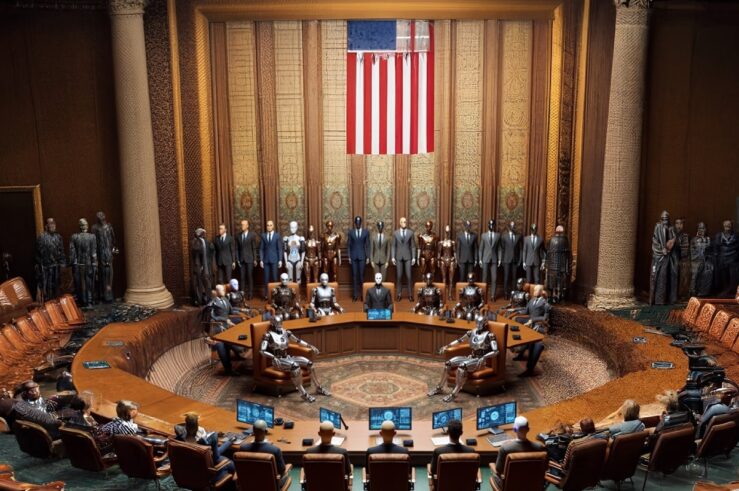One problem with a group blog is that you don’t always know what your co-bloggers are writing while you’re drafting a post. I drafted the following post without realizing that Larry (and Steve Bainbridge) had already gone to town on the matter — in more detail than I, not surprisingly. In any event, I’m posting my draft, which may be of interest to readers who aren’t as well-versed in insider trading law. The excellent Ribstein and Bainbridge posts are here, here, and here.
The Wall Street Journal is reporting that the Feds (the SEC, the FBI, and federal prosecutors in New York) are about to bring a host of insider trading charges “that could ensnare consultants, investment bankers, hedge-fund and mutual-fund traders and analysts across the nation.” The authorities, which have been investigating the situation for three years, are boasting that their criminal and civil probes “could eclipse the impact on the financial industry of any previous such investigation.”
The charges haven’t been filed, so we don’t know exactly who’s being accused of what, but the Journal suggests that the probe has focused on at least three matters. First, the Feds have examined whether traders received material, non-public information about pending merger deals. Second, authorities have focused on the activities of independent analysts and research boutiques. In addition, they have investigated firms that provide “expert network” services to hedge funds and mutual funds. Such firms “set up meetings and calls with current and former managers from hundreds of companies for traders seeking an investing edge.”
The first focus — insiders’ sharing of information about pending merger deals and tippees’ trading on the basis of such information — seems pretty uncontroversial. As a legal matter, the insiders owe a fiduciary duty to the shareholders whose stock is being traded, and in trading that stock (or effectively enlisting an accomplice tippee to do so) without first disclosing the information at issue, the insiders are failing to speak in the presence of a duty to do so. That’s fraud, and the tippee-traders are liable as accomplices. While I would generally prefer an approach that permits companies to establish their own insider trading policies and leaves it to capital markets to punish the value-destructive ones and reward those that enhance value, the ban on this type of insider trading is easiest to defend as a matter of policy: An insider or tippee who trades in advance of a merger may cause a price effect that thwarts or impairs the merger deal, thereby harming the corporation and its shareholders. Even if we left insider trading to contract, as I would prefer, I imagine that most firms and shareholders would bargain for a policy that bans trading on the basis of non-public information about a forthcoming merger.
The second and third focuses (foci?) of the Feds’ current probe, though, are more troubling. Again, we don’t know why the feds are currently going after independent analysts, research boutiques, and firms providing “expert network” services, but we do know that they have a long history of opposing legitimate stock analysis that gives certain traders an informational advantage over others. In the 1968 Texas Gulf Sulphur case, for example, the SEC maintained (and convinced the Second Circuit to hold) that the mere possession of material, non-public information saddles an investor with a duty to disclose that information before trading or to refrain from trading altogether. The Supreme Court ultimately rejected such a broad imposition of the so-called “disclose or abstain” duty, recognizing that the Texas Gulf Sulphur approach would ultimately hurt investors by disabling the securities analysis business. Analysts, after all, make money by ferreting out material, non-public information and conferring informational advantages on their clients. Their efforts, coupled with the trading of their informed clients, make stock markets more efficient, meaning that stock prices more accurately reflect the true value of the underlying companies. By making stock prices more accurate, analysts help prevent uninformed investors from losing their shirts when undisclosed information shocks the market. While I wouldn’t exactly call it the Lord’s work (not after the Lloyd Blankfein blunder, at least), securities analysis is awfully good for society and shouldn’t be discouraged.
The SEC, though, didn’t give up after its first Supreme Court smackdown. Just three years later, the Commission went after a “tippee” (Dirks) who had shared inside information with others who traded. The inside information concerned the fact that the corporation at issue had engaged in serious accounting fraud and was consequently overvalued. The tippee had learned about the fraud from an insider who sought the tippee’s assistance in exposing the fraud (which, incidentally, the SEC had failed to discover on its own). The SEC took the position that the tippee “inherited” the insider’s fiduciary duty not to trade (or tip to others who might trade) because he had received information from an insider — in other words, merely receiving non-public information from an insider essentially transforms one into an insider himself. Again, the Supreme Court rejected the SEC’s broad liability net. Noting again that the SEC’s rule would impair the securities analysis industry, the Court held that a tippee inherits an insider’s duty to disclose or abstain only if (1) the insider breaches his duty of loyalty in sharing the information (i.e., the insider shares the information to get a personal benefit) and (2) the tippee knows or should know of the breach.
The Supreme Court’s Dirks decision threw yet another wrench into the SEC’s campaign to put all investors on a level playing field when it comes to information (market efficiency be damned!) because it seemed to allow corporate insiders to share material, non-public information with stock analysts. In sharing non-public information with the analysts following their firm, insiders aren’t generally seeking a personal benefit, so the test for tipping isn’t satisfied and the analysts and their clients wouldn’t inherit the insiders’ duties. The SEC therefore responsed by promulgating Regulation FD, which requires corporate insiders who share data that could consitute material, non-public information to also share that information with the general public. If the information-sharing is intentional, the public must be informed contemporaneously with analysts; if information is unintentionally given (i.e., a “slip-up”), the general public must be promptly informed.
That sounds fair enough, right? Well, sure. But that fairness comes at a cost. Since Regulation FD was adopted, corporations have become more leery of sharing information with analysts — those folks whose efforts best protect investors by ensuring that stock prices accurately reflect underlying values. Spontaneous analyst conversations are impossible because corporations now have to publicize calls, provide call-in information to the public, etc. When analysts need help interpreting data, or if they have follow-up questions after an analyst conference, insiders generally won’t answer their questions. And, of course, analysts are now less interested in participating in analyst conferences, since the information being shared (with the general public) is less valuable. As Anup Agrawal, Sahiba Chadha, and Mark Chen have shown, the result has been a reduction in the accuracy of individual and consensus analyst forecasts on corporate performance and an increase in the dispersion among forecasts. Again, the SEC’s attempt to put investors on a level playing field seems to have impaired one of the most effective form of investor protection out there — the sell-side analyst industry. (NOTE: Larry has written lots of good stuff on Reg FD. Here‘s a link to a list of posts from Ideoblog.)
So what to make of this latest SEC/FBI/DOJ investigation? We won’t really know until we see the allegations. But in light of the SEC’s relentless pursuit of the securities analysis business over the years, I’m a bit worried that the current probe is focusing largely on analysts, research boutiques, and firms providing expert network services. We shall see….




